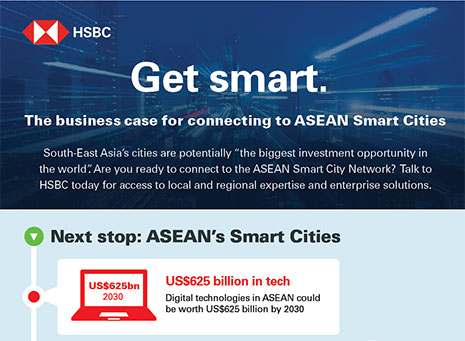- Article

- Growing my Business
- Expanding Abroad
The business case for investing in smart cities
From Da Nang in central Vietnam to Banyuwangi in eastern Indonesia a quiet transformation is underway across South-East Asia that could change the shape of some of the world’s fastest-growing cities.
The ASEAN Smart Cities Network (ASCN) is a year-old initiative that shows how regional economic integration is creating new opportunities for business investment and sales as fast-growing and potentially overburdened cities compete to modernise.
Are you ready to connect to the ASEAN Smart City Network?
The ASCN’s 26 flagship cities are all implementing their own unique action plans and then sharing the results with each other. This creates the potential for rapid adoption of innovation, from improving traffic management to more efficient water supply, to quickly flow across the region, as City Governments and businesses modify them to suit local circumstances. Singapore’s Chief Smart City Officer, Tan Chee Haw identifies the three pillars of the ASCN as creating business opportunities in the digital economy, shifting more control of urban services to citizens, and making sure the benefits of urban development are shared and spread.
HSBC Senior Adviser, Future Cities & New Industries, Professor Greg Clark says the new South-East Asian focus on cities is part of the biggest investment opportunity in the world. The demand for “good urbanisation”—well managed and effective urban solutions—in South-East Asia can boost cities’ productivity, reduce carbon footprints, improve living standards, and increase citizen satisfaction
This process, says Professor Clark, is occurring four-times faster in South-East Asia than was the case in the West. As such, it needs more proactive management and investment than has been seen elsewhere. “You have got a population that is fast-growing, with many more people joining the ‘consuming class’, and a clear link between social mobility and urbanisation. Across ASEAN there are diverse and distinct arrangements in governance, technology and investment platforms, so we need experiments and innovations, not just template solutions,” Professor Clark says.
It is through the cities that ASEAN is going to realise its promise. Not just as a successful trading block, but as a dedicated network of countries that improve the lives of all citizens. This calls for a much greater exchange of tools and ideas
New challenges require smart solutions
The ASCN agreement to share smart city ideas, but pursue them separately at the local level, emphasised bankable projects that can be taken to private investors and suppliers. As a result, the 26 flagship smart cities have now each nominated their priorities, from the cashless public transport system in Jakarta to integrated water management in Malaysia’s Johor Bahru.
Another integrated programme is Ho Chi Minh City’s plan to seek $53 billion in investment for 210 projects in transport infrastructure, education, healthcare, tourism and sport. This reflects the pressure Vietnam’s commercial capital is under as one of the region’s fastest-growing urban centres. Ho Chi Minh City’s priorities are an Intelligent Operations Centre and an Integrated Emergency Response Centre. The city is promising a radical initiative to make its data more transparent, which would enable businesses to pitch solutions to urban challenges such as traffic congestion.
Cities are doing it for themselves
Professor Clark says the challenge for business is to understand that cities are now often learning directly from one other—rather than following central government directions - and businesses are increasingly a major part of that innovation system. Businesses need to integrate with this process and realise that smaller cities, with relatively less-intensive IT infrastructure, still offer good investment and sales prospects.
He identifies an opportunity for South-East Asian businesses in improving the integration of urban services, such as aligning transport and real estate, tourism and education, health and housing or waste management and water services to reduce costs and improve amenity.
For example, Phuket, in Thailand, is pursuing an interesting integration project to deal with rising tourist numbers. One of the most-visited destinations in Asia, Phuket will collect data on tourist’s behaviour from Wi-Fi, the internet-of-things sensors, wristbands, GPS, and social media and then use this data to better collect waste, provide security and understand tourist consumption patterns. To achieve this, Phuket is looking for technical support in data analytics, business intelligence and facial recognition technology, as well as expertise in the fields of data management and blockchain.
Another important commercial entry point to the ASCN is the foreign development aid funding from countries including the US, Japan and Australia, which are involved in offering ideas from their own urban design experiences. This aid funding provides an entry channel for businesses which can align with the lender country priorities.
Professor Clark also says cities may have chosen flagship projects, but will need help from business in designing and budgeting the roll-out and scale-up. In April, HSBC presented ASEAN finance ministers with a series of recommendations for infrastructure development including a proposal for an Urban Infrastructure Network, which would provide training for city officials to develop bankable and sustainable smart city projects.
How businesses can make the most of this opportunity
The first step for businesses to break into this new regional opportunity is to look at the diverse projects being nominated by the ASCN cities and decide where their skillsets and solutions are most relevant and required. For example, Davao City has prioritised increasing public safety through intelligent surveillance and better data collection and assessment, and improving its urban transport through smart mobility. This creates an opportunity for mid-sized organisations with an ASEAN footprint that can offer information and communications technology expertise, security or transport services or solutions, or relevant consultancy and advisory services.
Having identified where their services are required, Professor Clark advises that businesses should then visit these cities to examine their funding plans and build contacts and networks. The smart city programme is now a fixture of the ASEAN meeting circuit with city officials meeting to benchmark their progress and look for business partners.
At HSBC, we have over 130 years of experience connecting businesses to ASEAN. With award winning trade and treasury solutions and more than 200 locations across ASEAN including Singapore, Malaysia, Indonesia, Thailand, Vietnam and the Philippines let us connect you.
Issued by HSBC Holding plc
Interested in expanding your business to ASEAN? Let us help.
The Association of Southeast Asian Nations (ASEAN)
Produced by (E) BrandConnect, a commercial division of The Economist Group, which operates separately from the editorial staffs of The Economist and The Economist Intelligence Unit. Neither (E) BrandConnect nor its affiliates accept any responsibility or liability for reliance by any party on this content.
The information contained in this ASEAN website is derived from sources we believe to be reliable but which we have not independently verified. HSBC makes no representation or warranty (express or implied) of any nature nor is any responsibility of any kind accepted with respect to the completeness or accuracy of any information, projection, representation or warranty (expressed or implied) in, or omission from, this ASEAN website. No liability is accepted whatsoever for any direct, indirect or consequential loss (whether arising in contract, tort or otherwise) arising from the use of or reliance on this ASEAN website or any information contained herein by the recipient or any third party. If you seek to rely in any way whatsoever upon any content contained in this ASEAN website, you do so at your own risk.
This ASEAN website does not constitute an offer or solicitation for, or advice that you should enter into or start using, any of the arrangement, product or services mentioned in this ASEAN website. Recipients should not rely on this ASEAN website in making any decisions and they should make their own independent appraisal of and investigations into the information described in this ASEAN website. No consideration has been given to the particular business objectives, financial situation or particular needs of any recipient. Any examples given are for the purposes of illustration only.
All the information set out in this ASEAN website is provided in good faith to the best of HSBC’s knowledge and understanding of the current law, rules, regulations, directions and guidelines governing or otherwise applicable to the relevant services offered by HSBC but HSBC makes no guarantee, representation or warranty and accepts no liability as to its accuracy or completeness. Future changes in such law, rules, regulations etc. could affect the information in this ASEAN website but HSBC is under no obligation to keep this information current or to update it. Expressions of opinion are those of HSBC only and are subject to change without notice.
Copyright © HSBC Bank Malaysia Berhad (Company No. 127776-V) 2019. All rights reserved. No part of this ASEAN website may be reproduced, stored in a retrieval system, or transmitted, on any form or by any means, electronic, mechanical, photocopying, recording, or otherwise, without the prior written permission of HSBC.





